[Greek] μανθάνω (manthanō), [Latin] discere: to learn, “to do the math,” to be educated, to receive instruction, to be instructed, to be apprised of, to increase one’s knowledge, to ascertain; Mt.9:13, Mt.11:29, Mt.24:32, Mk.13:28, Jn.6:45, Jn.7:15, Acts.23:27, Rom.16:17, 1Cor.4:6, 1Cor.14:31,35, Gal.3:2, Eph.4:20, Php.4:9,11, Col.1:7, 1Tim.2:11, 1Tim.5:4,13, 2Tim.3:7,14, Tit.3:14, Heb.5:8. Rev.14:3

Christ Washing the Feet of the Disciples: painting by Paolo Veronese (1580)
Background information:
Ancient Greek: This term can mean to direct one’s mind into something and to have accustomed oneself to something. The desire for intellectual knowledge is stressed. This term can be found in ordinary use, philosophical pursuits, and cultic practices. In Homer’s Illiad 6,444, Hektor states “I have learned to be valiant always and fight amid the foremost Trojans.” Plato thought that learning rudimentary knowledge and skills were indispensable for all members of the state. Such necessary subjects included reading, writing, song and music, arithmetic, geometry, astronomy, and physical education. In the cultic sphere, knowledge is receiving direction from a deity from an oracle.
Old Testament: This term essentially means to learn, to be trained, to teach, and to direct oneself to. The overriding sense of this term belongs in the cultic sphere. God is the object and goal of this term. Such objects include fear of God, the Law, scripture, wisdom, justice, and God’s will. Essentially, this term focuses on aspects of God and His will. The secular aspects of this term refers to learning a trade, getting information from something, and drawing knowledge from a book. The intellectual aspects of this term also focus on God. His sister stationed herself at a distance to find out what would happen to him (Ex.2:4). Lest you learn his ways, and get yourself into a snare (Prov.22:25). I will have them hear my words, that they may learn to fear me as long as they live (Deut.4:10). It was good for me to be afflicted, in order to learn your laws (Psa.118:71). Learn not the customs of the nations (Jer.10:2). I will praise you with a sincere heart as I study your just edicts (Psa.118:7). Take my advice, apply your mind to my words (Sir.16:24).
New Testament: Considering the frequent master/disciple dynamic between Jesus and the disciples, this term occurs only 25 times. Interestingly, the Greek mathetes, meaning disciple, refers to a pupil or learner. The Latin for disciple is discipulus. However, Jesus’ role is not to provide information but to awaken commitment to Him. The disciples are perceived more as followers (acolytes). Aside from ascertaining, learning and understanding are illustrated in various senses. Hearing plays an important role in this reception of this knowledge and faith. Jesus is given knowledge in scripture and understanding of God’s will. Others learn and follow from the example of Jesus. Learning may involve following correct teachings or falling astray.
Scripture:
“It is written in the prophets: ‘They shall all be taught by God.’ Everyone who listens to My Father and learns from Him comes to Me.” Jn.6:45
Jesus states that He and Father are one. Hearing plays a very important part in the beginning of understanding of faith.
“The Jews were amazed and said, ‘How does He know scripture without having studied?’” Jn. 7:15
Ordinarily children were taught to read and write by means of the scripture. The Jews were very unsettled in seeing Jesus already having this deep knowledge of scripture. They were also wondering how He could also teach like a rabbi.
“Keep on doing what you have learned and received and heard and seen in me.” Php. 4:19
Paul was acting as spiritual father to the Philippians. Hearing and seeing is very important and instrumental in learning and understanding the faith. With this comes the responsibility to learn to follow the right path in faith.
Conclusion:
Math, mathematics, discern, disciple
It is interesting to note that intellectual pursuits were highly valued during the ancient Greek era. The Greek tragedy, a very popular dramatic device, explored themes which described the human condition. Plato believed in a well-rounded (kyklos) education. This relates to the modern term encyclopedia.
I am not surprised that the Old Testament culture, in a cultic sense, focused on knowledge and aspects of God. A biblical scholar once stated, “The Greeks learned in order to comprehend, the Hebrews learned in order to adore.”
I was surprised that the New Testament culture did not really focus on the teacher/student relationship between Jesus and the disciples. The disciples were students in an only limited sense. This is interesting in that there are only three references of this term in the gospel of Matthew. The gospel of Matthew is considered a teaching gospel.
Discernment can be a process of learning about one’s vocation. This process can often involve hearing, praying, reading, and learning. Hearing often becomes the first step in learning and understanding.
So, it all adds up. You can do the math! Jesus was trying to set an example for a bunch of uneducated and unprepared students (disciples) to follow Him. Evidently, Jesus did not have much to work with! Jesus perhaps did lecture in some capacity. But His actions spoke volumes in His leading by example.
“Life is a math question. In order to gain the most, you have to know how to convert negatives into positives.”–Anonymous
